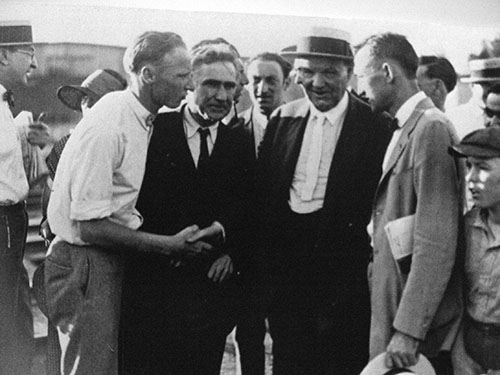
FAYETTEVILLE, Ark. – A new book co-written by University of Arkansas professor William F. McComas blends photographs and text to tell the story of the famous Scopes “Monkey” trial that challenged evolution education almost 100 years ago and has themes that resonate today.
The book, The Scopes Monkey Trial, is published by Arcadia Publishing as part of its “Images of America” series. McComas co-wrote the book with Randy Moore, a University of Minnesota biology professor and fellow expert on the history of evolution.
In the trial, John Scopes, a high school science teacher, was charged in 1925 with teaching evolution in Dayton, Tennessee. McComas said the case dealt with fundamental issues such as “what is science,” and “what is the role of the majority opinion in a democratic system.”
McComas is the inaugural holder of the Parks Family Professorship of Science Education in the College of Education and Health Professions. He teaches an interdisciplinary class for U of A Honors College undergraduates called “The Darwin Course” and has written a number of articles on evolution and evolution education. Recently, he received the Evolution Education Award presented by the National Association of Biology Teachers, recognizing innovative classroom teaching and community education efforts to promote the accurate understanding of biological evolution.
“To prepare for the Honors College class, I revisited the Scopes trial from both scholarly and pedagogical perspectives,” McComas said. “The people of Tennessee a century ago believed that they had the right to dictate the nature of the school curriculum and did so through the Butler Act that drastically minimizing the teaching of evolution. They simply neglected to consider the reality that evolution is the only scientific explanation that explains the diversity and inter-relatedness of life.”
A jury found Scopes guilty on July 25, 1925, and a judge fined him $100, but the trial ultimately produced no legal precedent to settle the debate. Similar laws in other states, including Arkansas, had a dulling effect on their science curriculums that lasted well into the 1970s, when Scopes-like laws were overturned and evolution finally returned to the classroom. This book discusses various court cases beyond Scopes that have led to the current situation where the only scientific explanation for biological change through time is evolution.
“Evolution may be an ‘inconvenient truth’ in the minds of some, but it is still the truth,” McComas said. “Students’ science education would be incomplete without knowledge of evolution, but unfortunately we still see an attack on evolution education along with other challenges such as the desire on the part of some to downplay climate change discussion in schools. This occurs frequently even though both evolution and climate change are firmly established scientific ideas.”
McComas wanted to make the Scopes story as accessible as possible by using images, some that have only rarely been seen before, to accompany the text. He and co-author Moore traveled to Dayton to talk to local residents who had family connections to the trial. They also found images and documents at Bryan College in Dayton, the Smithsonian Institution archives, the Library of Congress and other libraries in Tennessee and beyond.
“The huge number of images included will introduce readers almost firsthand to the actual persons who played vital roles in what was called the ‘trial of the century’ in a small town in Tennessee and tell the story of the impact that this trial had and still has on science teaching and learning,” McComas said. “Even a century after Scopes, we still find a sizable portion of the U.S. population uninformed and/or unaccepting of one of the most fundamental scientific ideas, and our hope is that those who read this new retelling of the origin, trial and aftermath of the trial learn of its role in the history of evolution education in the U.S.”
About the University of Arkansas: The University of Arkansas provides an internationally competitive education for undergraduate and graduate students in more than 200 academic programs. The university contributes new knowledge, economic development, basic and applied research, and creative activity while also providing service to academic and professional disciplines. The Carnegie Foundation classifies the University of Arkansas among only 2 percent of universities in America that have the highest level of research activity. U.S. News & World Report ranks the University of Arkansas among its top American public research universities. Founded in 1871, the University of Arkansas comprises 10 colleges and schools and maintains a low student-to-faculty ratio that promotes personal attention and close mentoring.
Topics
Contacts
William F. McComas, Parks Family Professor of Science Education
College of Education and Health Professions
479-575-7525,
Heidi Wells, director of communications
College of Education and Health Professions
479-575-3138,